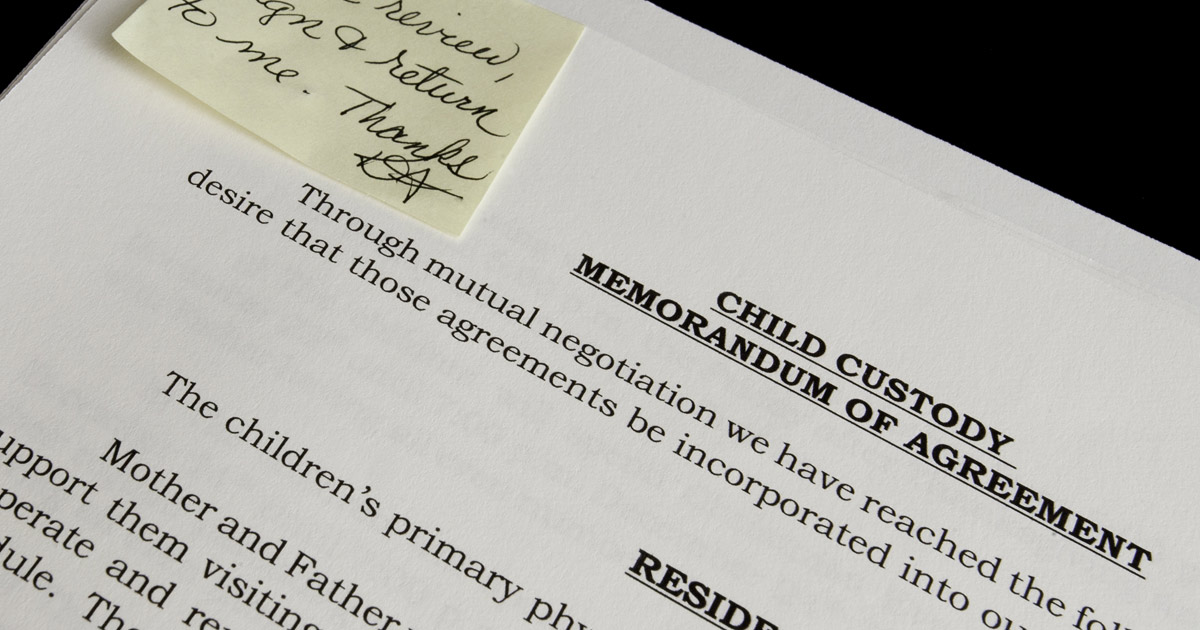What Should be Included in a Successful Child Custody Agreement?

A lot of consideration goes into a child custody agreement. Education, medical care, and the different forms of communication should be clearly spelled out in the agreement. This can help prevent conflict and keep children on an agreed-upon schedule for their benefit. It also saves divorcing parents the cost and time of a custody battle. Two types of custody are included in a custody agreement:
Legal Custody: Legal custody allows a parent to make decisions about the child’s education, medical care, and other major, long-term issues. Legal custody is meant to simplify decision-making for future legal decisions that will significantly impact the child. Legal custody is agreed upon by both parents.
Physical Custody: Physical custody, which is also agreed upon by the parents, focuses on the day-to-day decisions a parent makes while the child lives with them. The designation of a custodial parent is one of the most important aspects of physical custody. Having one custodial parent is generally the least disruptive and most practical arrangement for a child and allows the other parent to remain involved in the child’s life.
For both types of custody, parents must agree on either sole or joint custody. They can be different for both. For example, one parent may have sole physical custody, but both parents can have joint legal custody.
What Topics are Typically Addressed in Child Custody Agreements?
While every child custody agreement is different, several common topics are discussed:
Visitation Schedules
A visitation schedule depends on which parent has sole physical custody or if there is joint custody. When one parent has sole physical custody, the other parent will generally have visitation rights. A visitation schedule will specify which days of the week, holidays, birthdays, or other special days the non-custodial parent can have with the child and for what exact hours.
Education, Religion, and Medical Care
A custody agreement should address how and when the parents will communicate about medical issues, education, visitation, activities, and other issues. The agreement should spell out where the child will attend school and under what religion the child will be raised, along with expectations for church attendance and religious instruction. Specifications for medical care, dental care, and insurance will also be included.
The custody agreement should state whose insurance the child will be on, who pays for out-of-pocket medical expenses, and where the child will receive medical care. The agreement should also define requirements about providing insurance cards and information to the other party, instructions for emergency care, and daily and specialized care if the child has a chronic medical condition.
Agreement on Where Each Parent Lives
Stipulations about where each parent lives and their ability to move, within or outside a current school district, should be included in the custody agreement. The agreement should also specify how and when the parent who wants to move must notify the other parent.
Child Care Costs
Parents should agree on who will provide for childcare and who will pay for it. Parents should also let the care providers know who can pick up the child as well. An agreement should outline whether parents make decisions together or separately. For example, they may decide that one parent makes decisions about health care, while the other makes decisions about religion.
Extracurricular and School Activities
The custody agreement should set rules about the type and amount of the child’s extracurricular activities, parental participation in school activities, and sporting events. Special requirements should also be discussed, such as costs, transportation, equipment needs, and practices related to the child’s events and activities.
Transportation and Exchanges
The custody agreement should spell out who will transport the child to school, church, and other activities. It should also define how and where the child will be transported to the other parent’s home for visitation or overnight stays. For example, will the non-custodial parent pick up the child, or will they exchange the child at an agreed-upon place?
Discipline and Day-to-Day Parenting
A custody agreement should include guidelines for how the child will live each day. What type of discipline is appropriate? What time does the child go to bed? Expectations around food and meals, personal care and hygiene, and care of the child’s property can also be part of the agreement. For example, should the child pack a bag for visitations, or will certain clothes, toys, or other property stay with the non-custodial parent?
Travel Costs
A custody agreement will ideally address travel and vacations. For example, if one parent has family in a different country, parents should agree on whether the child can visit overseas. Vacation destinations and length of vacations should also be agreed upon. Some locations or activities may not be mutually agreed upon by both parents.
Miscellaneous Expenses
While alimony and child support requirements are standard in a divorce decree, who pays for miscellaneous expenses should also be included in the custody agreement. These expenses include school tuition and fees, sports, classes, equipment, extracurricular activities, car insurance, and other costs. Additionally, a custody agreement should spell out who can claim the child as a dependent on their taxes.
What is the Process for Resolving Child Custody Disputes?
Even with the most thorough custody agreements, there may be times when parents disagree about a course of action regarding the child. Having a defined process for dispute resolution can save parents stress, time, and money. If they cannot agree between themselves, they will need to go to court before a judge.
Can I Modify an Existing Child Custody Agreement?
There may be significant changes in a parent’s life that necessitate changes in a custody agreement, such as a job change, relocation, or an alter in necessary care for the child. The custody agreement should spell out how parents can modify the terms. However, the agreement itself should address future needs whenever it is possible. For example, the agreement should acknowledge that a visitation schedule will need to change when a toddler starts school. The best resolution is for parents to agree on the changes as they occur and follow the agreement’s process for modifying the agreement. If this is not possible, a judge must rule on the disputed changes. A divorce lawyer can help with changes to a child custody agreement.
Bucks County Divorce Lawyers at Freedman & Lorry, P.C. Help Clients with Child Custody Modifications
When constructing a child custody agreement, it is important to have the child’s best interests in mind. A Bucks County divorce lawyer at Freedman & Lorry, P.C. will offer you objective guidance. Call us at 215-925-8400 or complete our online form for a free consultation today. Located in Philadelphia, and Cherry Hill, New Jersey, we serve clients throughout Pennsylvania.
